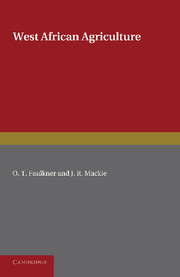Book contents
- Frontmatter
- Contents
- Preface
- PART I GENERAL
- PART II CROPS AND STOCK
- Chapter 9 The Oil Palm
- Chapter 10 Cocoa, Kola, Coconuts, Rubber
- Chapter 11 Cotton, Groundnuts, Benniseed, Ginger
- Chapter 12 Cereal Crops: Maize, Guinea Corn, Millets, Rice
- Chapter 13 Root Crops and Minor Food Crops: Yams, Cassava, Sweet Potatoes, Coco Yams, Beans and Cowpeas, Bambara Groundnut, Onions and Vegetables
- Chapter 14 Livestock
- Index
Chapter 14 - Livestock
from PART II - CROPS AND STOCK
Published online by Cambridge University Press: 05 June 2016
- Frontmatter
- Contents
- Preface
- PART I GENERAL
- PART II CROPS AND STOCK
- Chapter 9 The Oil Palm
- Chapter 10 Cocoa, Kola, Coconuts, Rubber
- Chapter 11 Cotton, Groundnuts, Benniseed, Ginger
- Chapter 12 Cereal Crops: Maize, Guinea Corn, Millets, Rice
- Chapter 13 Root Crops and Minor Food Crops: Yams, Cassava, Sweet Potatoes, Coco Yams, Beans and Cowpeas, Bambara Groundnut, Onions and Vegetables
- Chapter 14 Livestock
- Index
Summary
The domestic live stock of West Africa includes horses, donkeys, cattle, pigs, sheep, goats, fowls, guinea-fowl, turkeys and guinea-pigs. Cattle and horses are practically confined to Northern Nigeria and the Northern Territories of the Gold Coast. Sheep, goats and fowls are universal, but pigs are only found in non-Muhammedan areas.
Nearly every farmer owns a few head of sheep or goats, and in many parts of the south they form almost the only source of meat for the ordinary people. There are several distinct types of both sheep and goats; those of the south are very small with comparatively short legs, while those of the north are large and leggy. Some of the Hausa goats are very big indeed and appear to be good milkers. In British West Africa, all the types of sheep are hairy, not woolly; but in the French Sudan there is a breed of woolly sheep, and experiments are being conducted by the Nigerian Veterinary Department to test the possibility of breeding a race of wool-bearing sheep by crossing the local sheep with imported types. Apart from this, no serious attempt has ever been made to improve West African sheep or goats whether from the point of view of meat, milk or skins; nor has their value as manure makers ever been exploited by folding. They roam freely over the fields during the day in the dry season, picking up whatever fodder they can find; during the rains they are kept in the compound by day as well as night in order to prevent them from damaging crops. The skins of both sheep and goats are a valuable article of commerce, and those from parts of Northern Nigeria are of very high quality; but many of them, perhaps 60 per cent., are spoilt by disease and bad flaying. The Veterinary Department has in the last few years, with considerable success, made efforts to improve the flaying, especially in the bigger towns.
In Nigeria an attempt has been made to start a flock of sheep on the experimental farm at Ilorin; but this attempt has been very severely handicapped by heavy losses due to disease, especially among some sheep which were taken down from farther north.
- Type
- Chapter
- Information
- West African Agriculture , pp. 156 - 164Publisher: Cambridge University PressPrint publication year: 2013



